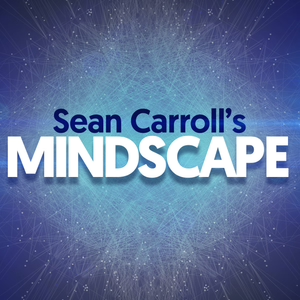
Ep. 32: Empowering BIPOC Communities by Going Back to the Land (feat. Indy Srinath)
08/12/20 • 78 min
Today on Mushroom Hour we are honored to be joined by Indy Srinath. Indy is a forager, educator, gardener, mushroom cultivator, and steward of both her environment and her community. Her work brings many of the principles that we discuss on Mushroom Hour - wild food, mycology, permaculture, environmentalism - into urban settings and into a relational context with BIPOC communities.
Please support Indy's campaign to create a BIPOC community farm!
https://www.gofundme.com/f/community-urban-farm-fund
Our journey begins in North Carolina where a high-school aged Indy, disillusioned by traditional education, starts to develop a relationship with the land. Before you know it, we're WWOOFing along the California coast, helping at organic farms and picking up land-based skills along the way. Returning to Asheville, NC to steward a 7-acre permaculture farm and cultivate mushrooms may seem like the dream to many of us, but it is just another stepping stone for Indy's ultimate vision. Changing scenes to the concrete jungle of LA, Indy employs the skills she's developed in herbalism, foraging and permaculture to purposefully empower chronically under-served houseless populations and BIPOC communities. What are some permaculture principles we can employ to grow food even in urban environments? Are urban agriculture and foraging useful tools in addressing major social issues like food apartheid in inner cities?
Her mission brings some particularly poignant questions to the surface. America's undergoing a cultural reckoning as European-Americans (colloquially "White") are forced to reconcile their status quo with generational and systemic disadvantages BIPOC communities face. Amidst protest, desires to help and gestures of allyship, we are reminded that access to land, or a lack-there-of, lies at the heart of America's glaring economic, political and social imbalance. This difference in land access even spills over into land-based disciplines like farming and wild food foraging. Why are practices like farming and foraging largely the domain of European-Americans now, despite having indigenous and BIPOC roots? What are some strategies to correct this imbalance and help BIPOC Americans return to the land?
As more minds turn to the idea of reparations as the most obvious solution to help heal a centuries-old trauma between European-Americans and BIPOC-Americans, Indy encourages us to remember that while interpersonal-reparations are a good start, what we really need are institutional reparations (ie. big banks, governments) to redress generational economic inequality. Ownership of land once more centers our conversation and provides a myriad of tangible solutions. How does a focus on increasing BIPOC ownership of land truly empower communities and address generational economic, political and social imbalances that America must reconcile if it is ever to become whole?
Episode Resources
Indy IG: https://www.instagram.com/indyofficinalis/
Fallen Fruit: http://fallenfruit.org/
WWOOF: https://wwoof.net/
Leah Thomas (Inspiration): https://www.instagram.com/greengirlleah/
Hypomyces Lactifluorum (mushroom): https://en.wikipedia.org/wiki/Hypomyces_lactifluorum
Cordyceps Militaris (mushroom): https://en.wikipedia.org/wiki/Cordyceps_militaris
Today on Mushroom Hour we are honored to be joined by Indy Srinath. Indy is a forager, educator, gardener, mushroom cultivator, and steward of both her environment and her community. Her work brings many of the principles that we discuss on Mushroom Hour - wild food, mycology, permaculture, environmentalism - into urban settings and into a relational context with BIPOC communities.
Please support Indy's campaign to create a BIPOC community farm!
https://www.gofundme.com/f/community-urban-farm-fund
Our journey begins in North Carolina where a high-school aged Indy, disillusioned by traditional education, starts to develop a relationship with the land. Before you know it, we're WWOOFing along the California coast, helping at organic farms and picking up land-based skills along the way. Returning to Asheville, NC to steward a 7-acre permaculture farm and cultivate mushrooms may seem like the dream to many of us, but it is just another stepping stone for Indy's ultimate vision. Changing scenes to the concrete jungle of LA, Indy employs the skills she's developed in herbalism, foraging and permaculture to purposefully empower chronically under-served houseless populations and BIPOC communities. What are some permaculture principles we can employ to grow food even in urban environments? Are urban agriculture and foraging useful tools in addressing major social issues like food apartheid in inner cities?
Her mission brings some particularly poignant questions to the surface. America's undergoing a cultural reckoning as European-Americans (colloquially "White") are forced to reconcile their status quo with generational and systemic disadvantages BIPOC communities face. Amidst protest, desires to help and gestures of allyship, we are reminded that access to land, or a lack-there-of, lies at the heart of America's glaring economic, political and social imbalance. This difference in land access even spills over into land-based disciplines like farming and wild food foraging. Why are practices like farming and foraging largely the domain of European-Americans now, despite having indigenous and BIPOC roots? What are some strategies to correct this imbalance and help BIPOC Americans return to the land?
As more minds turn to the idea of reparations as the most obvious solution to help heal a centuries-old trauma between European-Americans and BIPOC-Americans, Indy encourages us to remember that while interpersonal-reparations are a good start, what we really need are institutional reparations (ie. big banks, governments) to redress generational economic inequality. Ownership of land once more centers our conversation and provides a myriad of tangible solutions. How does a focus on increasing BIPOC ownership of land truly empower communities and address generational economic, political and social imbalances that America must reconcile if it is ever to become whole?
Episode Resources
Indy IG: https://www.instagram.com/indyofficinalis/
Fallen Fruit: http://fallenfruit.org/
WWOOF: https://wwoof.net/
Leah Thomas (Inspiration): https://www.instagram.com/greengirlleah/
Hypomyces Lactifluorum (mushroom): https://en.wikipedia.org/wiki/Hypomyces_lactifluorum
Cordyceps Militaris (mushroom): https://en.wikipedia.org/wiki/Cordyceps_militaris
Previous Episode

Ep. 31: How to Quit Your Job and Devote Your Life to Mushrooms (feat. John Michelotti)
Today on Mushroom Hour we are graced by the presence of John Michelotti. John is the founder of Catskill Fungi and past President of the Mid-Hudson Mycological Association (MHMA). His goal is to inspire people to partner with fungi to improve their health, communities, and the environment.
Our journey takes us to the Catskill Mountains in New York state where we find a young John spending the summer on his grandfather's farm - whose grounds were some of the favorite mushroom foraging spots of Gordon Wasson! After spending a childhood in nature, John pursued many paths until his fateful connection with the Connecticut-Westchester Mycological Association. One the group's leaders, the mycology legend Gary Lincoff, become John's mentor and inspired him to dedicate his life to working with fungi. Sadly, Gary passed away in March of 2018. What was Gary really like and how did his unique background make him such a charismatic ambassador of the fungal world?
John's pursuit of fungal abundance took him to the jungles of Ecuador as he had the transformative opportunity to participate in the Amazon MycoRenewal project led by Mia Maltz. Armed with more knowledge and an even deeper passion for fungi, John movedback to the Catskills to his grandfather's farm and joined the Mid-Hudson Mycological Association. Inspired by his days with the Westchester Mycology Club, John set about building community and eventually became Association President. Catskill Fungi was born as another way for John to share knowledge and form community around a love of mushrooms via presentations, workshops and mushroom walks. Learning about how fungi improves our health, John mastered a triple extraction technique for making medicinal mushroom tinctures of the highest quality and even teaches others how to do the exact same process. Catskill Fungi now provides an assortment of medicinal mushroom tinctures made from local, foraged and organically-grown mushrooms like lions mane, reishi, chaga and turkey tail. Why does John feel its so critical to teach these skills to others even if it means selling less of his own products?
Hearing John's story and his commitment to fungi moves us all to action and we'll feel the call of those immortal words of Gary Lincoff to, "Quit your job and dedicate your life to mushrooms!" Mushrooms and fungi are a key tool to improve humanity's outlook into the future. By pairing with fungi we all can pursue a life work that improves the community, the environment, and our personal health. It's easier than you think - you don't even need to quit your job! We'll become the extra-radical mycelia, reaching out beyond whats comfortable and transform the planet for the better!
Episode Resources
Catskill Fungi IG: https://www.instagram.com/catskillfungi/
Catskill Fungi website: https://www.catskillfungi.com/
Mid Hudson Mycological Association: http://www.midhudsonmyco.org/
Connecticut-Westchester Mycological Association: http://www.comafungi.org/
Gary Lincoff: http://garylincoff.com/
Violet Tooth Polypore (Mushroom): https://www.mushroomexpert.com/trichaptum_biforme.html
Phaeocalicium polyporaeum (Mushroom): https://mushroomobserver.org/name/show_name/6449
Amazon MycoRenewal: https://www.amazonmycorenewal.org/
Mushroom Shed: https://www.mushroomshed.us/
Next Episode

Ep. 33: Marrow of the Mountain - Defending Biodiversity in Ecuador (feat. Dr. Roo Vandergrift)
Today we are graced by the presence of Dr. Roo Vandegrift - queer scientist, illustrator and producer of the forthcoming documentary film Marrow of the Mountain. Roo received his doctorate in mycology from the University of Oregon’s Institute of Ecology and Evolution, doing much of his dissertation work on the ecology of fungi at Los Cedros, in Ecuador.
Please support Roo's documentary "Marrow of the Mountain":
https://www.kickstarter.com/projects/werdnus/marrow-of-the-mountain-the-covid-emergency-fundraiser?ref=discovery&term=marrow%20of%20the%20mountain
Help their team bring international attention to the threat posed by international mining companies to biodiversity and environmental health in Ecuador!
Getting lost in the jungles of Ecuador, we find Roo Vandergrift crawling through the undergrowth of the Los Cedros bio-reserve performing fungal diversity surveys. Originally studying the genus xylaria, Roo quickly fell in love with Los Cedros and his relationship with this vibrant and powerful land would change his life forever.
Multinational mining companies have bought the rights to huge swaths of the country, leaving Ecuador’s most sensitive and biodiverse habitats at the mercy of international mining interests. This happened suddenly, and without public knowledge or consent. We witness the deep impact of extractive industry on Ecuadorian lives, as three women struggle to protect their families and communities whilst the land is being sold out from under their feet. Told in the powerful voices of Afro-Ecuadorian farmer Isabel Anangonó, indigenous leader Filomena Rosero, and scientist and activist Elisa Levy, and following a scientific expedition into the heart of the rainforest, this film explores the impact of mining on people's lives with both beauty and stark candor. How did the International Monetary Fund set in motion circumstances that would clear a path for giant Australian and Canadian mining corporations to gain access to mining territories, even in areas protected by environmental legislation? How is a pending Constitutional Court Case ruling pivotal in the future of protecting Ecuador's biodiversity from destructive mining?
Due to the COVID-19 lockdowns all people, including activists, have been forced inside. This has allowed international mining companies to continue their illegal mining and environmental destruction without any resistance. These same lockdowns have also meant that the documentary has been set back. So the Marrow of the Mountain team needs all of our support on their new Kickstarter! Empower this documentary activism and help defend biodiversity.
Episode Resources
Marrow of the Mountain Documentary Website: https://marrowofthemountain.com/
Roo Vandergrift IG: https://www.instagram.com/werdnus_roo/
Reserva Los Cedros: https://reservaloscedros.org/
OMASNE: https://www.facebook.com/OMASNE/
Spatial Ecology of the Fungal Genus Xylaria in Cloud Forests (article): https://onlinelibrary.wiley.com/doi/abs/10.1111/btp.12273
If you like this episode you’ll love
Episode Comments
Generate a badge
Get a badge for your website that links back to this episode
<a href="https://goodpods.com/podcasts/the-mushroom-hour-podcast-137029/ep-32-empowering-bipoc-communities-by-going-back-to-the-land-feat-indy-6711092"> <img src="https://storage.googleapis.com/goodpods-images-bucket/badges/generic-badge-1.svg" alt="listen to ep. 32: empowering bipoc communities by going back to the land (feat. indy srinath) on goodpods" style="width: 225px" /> </a>
Copy




